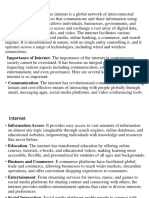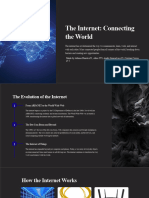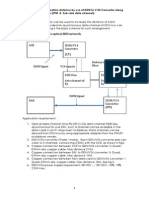The Evolution of the Internet: From ARPANET to
the Digital Age
Introduction
The Internet is one of the most transformative technologies in human history, reshaping
communication, commerce, education, and entertainment. Its origins trace back to military research
projects in the mid-20th century, but today it has become a global infrastructure connecting billions
of people worldwide.
�The Birth of ARPANET
The Internet’s story begins with ARPANET, a project funded by the U.S. Department of Defense in
the late 1960s. Its goal was to develop a communication network that could survive potential
disruptions during the Cold War. The first successful message sent in 1969 between UCLA and
Stanford Research Institute marked the birth of networked communication.
�Development of Networking Protocols
In the 1970s and 1980s, scientists such as Vinton Cerf and Robert Kahn developed the
Transmission Control Protocol (TCP) and the Internet Protocol (IP), which remain the foundation of
Internet communication today. These protocols enabled different networks to connect and
communicate, creating the framework for a global network of networks.
�The Rise of the World Wide Web
While the Internet existed for decades, it became accessible to the general public in the early 1990s
with the invention of the World Wide Web by Tim Berners-Lee. The introduction of web browsers,
such as Mosaic and later Netscape, made it possible to navigate the Internet easily. This
development led to a surge in websites, online services, and digital communication.
�E-Commerce and Digital Economy
The 1990s also witnessed the birth of e-commerce. Companies like Amazon and eBay pioneered
online shopping, changing the way consumers interact with businesses. Today, e-commerce is a
multitrillion-dollar industry, with platforms such as Alibaba, Shopify, and countless others
dominating the digital marketplace.
�Social Media Revolution
In the 2000s, social media transformed the Internet into a platform for personal expression and
global communication. Platforms like Facebook, Twitter, Instagram, and TikTok have reshaped how
people connect, share information, and even influence politics. While offering opportunities for
connection, social media also raises concerns about misinformation, privacy, and mental health.
�Streaming and Entertainment
The rise of high-speed Internet made streaming possible. Platforms like YouTube, Netflix, and
Spotify revolutionized entertainment, allowing users to access movies, music, and videos instantly.
Traditional industries, such as television and music distribution, were forced to adapt to the
on-demand digital model.
�Cybersecurity and Privacy
As the Internet grew, so did concerns about security and privacy. Cyberattacks, identity theft, and
data breaches became common challenges. The rise of surveillance capitalism, where companies
monetize user data, has sparked debates about digital ethics, regulation, and individual rights.
�The Internet of Things (IoT)
The Internet has expanded beyond computers and smartphones to include everyday devices. The
Internet of Things connects smart appliances, vehicles, wearable devices, and industrial systems,
offering convenience and efficiency but also raising new security and privacy challenges.
�Future of the Internet
The Internet continues to evolve. Advances in 5G technology, quantum computing, and artificial
intelligence will reshape how people interact online. The idea of a decentralized Web (Web3)
promises to give users greater control over their data and digital identities. At the same time,
questions about digital divides, online governance, and cybersecurity will shape the future of the
digital age.
�Conclusion
From its origins as a Cold War project to its role as a cornerstone of modern society, the Internet
has transformed nearly every aspect of human life. Its continued evolution will bring both
opportunities and challenges, ensuring that its impact will remain central to the future of humanity.
�References
1. Abbate, J. (1999). Inventing the Internet 2. Berners-Lee, T. (2000). Weaving the Web 3. Castells,
M. (2001). The Internet Galaxy: Reflections on the Internet, Business, and Society 4. Hafner, K., &
Lyon, M. (1996). Where Wizards Stay Up Late: The Origins of the Internet




























































































